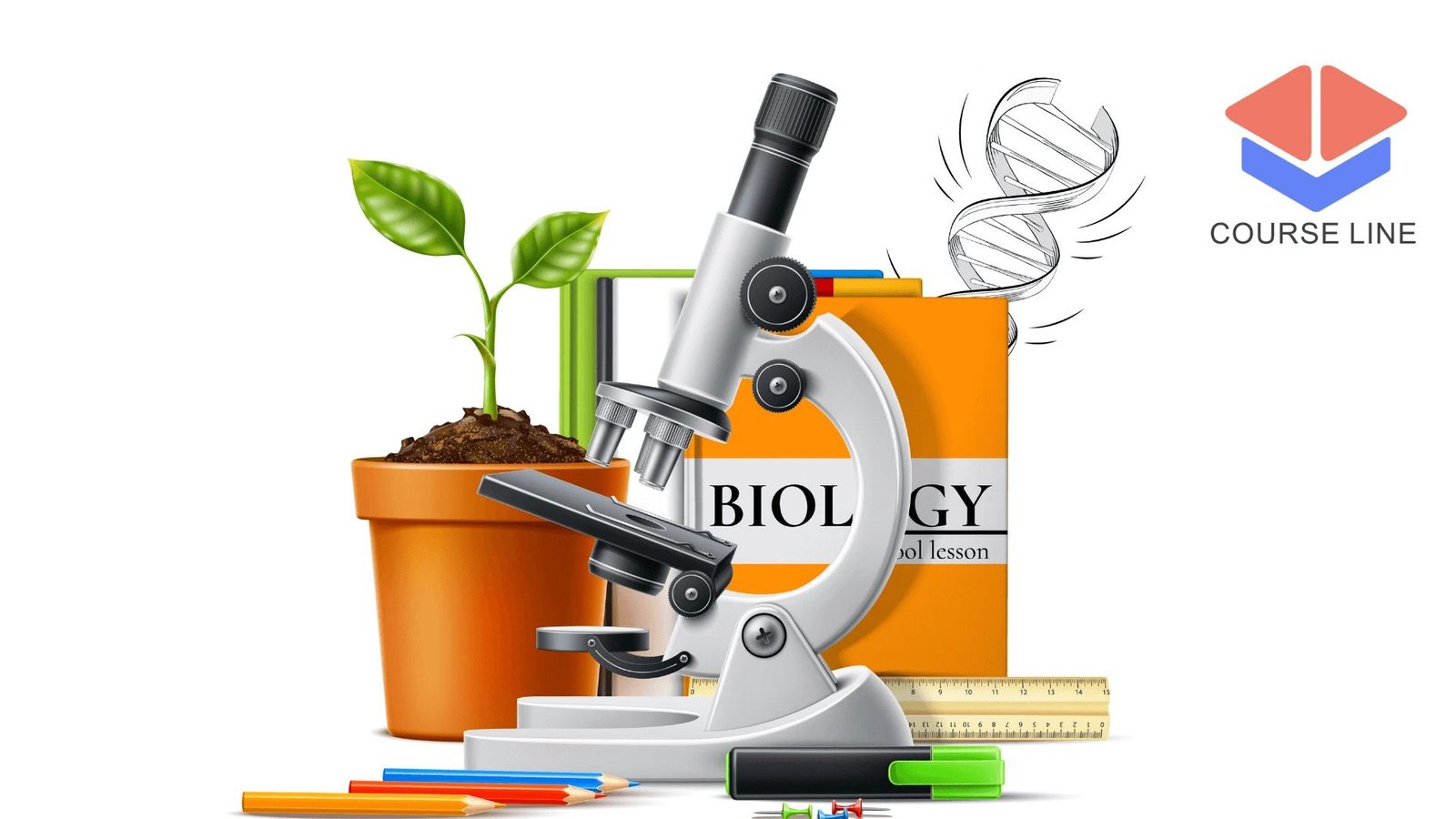Course Features
Price
Study Method
Online | Self-paced
Course Format
Reading Material - PDF, article
Duration
4 hours, 35 minutes
Qualification
No formal qualification
Certificate
At completion
Additional info
Coming soon
- Share
Overview
The A Level Biology course offers an extensive exploration of the core principles of biology, designed to deepen students' understanding of the natural world. Starting with an introduction to biology and the scientific method, the course delves into the fascinating world of cell biology, including the study of biomolecules such as carbohydrates, proteins, lipids, and nucleic acids. Students will explore the intricacies of enzymes, cell structure, and function, providing a solid foundation in biochemistry and cellular biology.
As the course progresses, students will learn about genetics, including Mendelian inheritance, non-Mendelian inheritance, and the structure and replication of DNA. Advanced topics in genetics such as genetic engineering and biotechnology will also be covered. Evolutionary biology is another critical area, where students will study natural selection, adaptation, and the mechanisms of evolution, supported by evidence for evolutionary processes. The course also covers ecology, emphasizing ecosystems, biodiversity, and the environmental impact of human activities.
The study of physiology and homeostasis will give students insight into animal and plant systems, including processes like respiration, digestion, and the regulation of internal conditions. Through practical laboratory sessions, students will hone their investigative skills, learning experimental design, data analysis, and other vital scientific techniques. This hands-on experience will complement their theoretical knowledge, ensuring they are well-prepared for advanced biological studies or careers in scientific fields.
Who is this course for?
The A Level Biology course offers an extensive exploration of the core principles of biology, designed to deepen students' understanding of the natural world. Starting with an introduction to biology and the scientific method, the course delves into the fascinating world of cell biology, including the study of biomolecules such as carbohydrates, proteins, lipids, and nucleic acids. Students will explore the intricacies of enzymes, cell structure, and function, providing a solid foundation in biochemistry and cellular biology.
As the course progresses, students will learn about genetics, including Mendelian inheritance, non-Mendelian inheritance, and the structure and replication of DNA. Advanced topics in genetics such as genetic engineering and biotechnology will also be covered. Evolutionary biology is another critical area, where students will study natural selection, adaptation, and the mechanisms of evolution, supported by evidence for evolutionary processes. The course also covers ecology, emphasizing ecosystems, biodiversity, and the environmental impact of human activities.
The study of physiology and homeostasis will give students insight into animal and plant systems, including processes like respiration, digestion, and the regulation of internal conditions. Through practical laboratory sessions, students will hone their investigative skills, learning experimental design, data analysis, and other vital scientific techniques. This hands-on experience will complement their theoretical knowledge, ensuring they are well-prepared for advanced biological studies or careers in scientific fields.
Requirements
The A Level Biology course offers an extensive exploration of the core principles of biology, designed to deepen students' understanding of the natural world. Starting with an introduction to biology and the scientific method, the course delves into the fascinating world of cell biology, including the study of biomolecules such as carbohydrates, proteins, lipids, and nucleic acids. Students will explore the intricacies of enzymes, cell structure, and function, providing a solid foundation in biochemistry and cellular biology.
As the course progresses, students will learn about genetics, including Mendelian inheritance, non-Mendelian inheritance, and the structure and replication of DNA. Advanced topics in genetics such as genetic engineering and biotechnology will also be covered. Evolutionary biology is another critical area, where students will study natural selection, adaptation, and the mechanisms of evolution, supported by evidence for evolutionary processes. The course also covers ecology, emphasizing ecosystems, biodiversity, and the environmental impact of human activities.
The study of physiology and homeostasis will give students insight into animal and plant systems, including processes like respiration, digestion, and the regulation of internal conditions. Through practical laboratory sessions, students will hone their investigative skills, learning experimental design, data analysis, and other vital scientific techniques. This hands-on experience will complement their theoretical knowledge, ensuring they are well-prepared for advanced biological studies or careers in scientific fields.
Career path
The A Level Biology course offers an extensive exploration of the core principles of biology, designed to deepen students' understanding of the natural world. Starting with an introduction to biology and the scientific method, the course delves into the fascinating world of cell biology, including the study of biomolecules such as carbohydrates, proteins, lipids, and nucleic acids. Students will explore the intricacies of enzymes, cell structure, and function, providing a solid foundation in biochemistry and cellular biology.
As the course progresses, students will learn about genetics, including Mendelian inheritance, non-Mendelian inheritance, and the structure and replication of DNA. Advanced topics in genetics such as genetic engineering and biotechnology will also be covered. Evolutionary biology is another critical area, where students will study natural selection, adaptation, and the mechanisms of evolution, supported by evidence for evolutionary processes. The course also covers ecology, emphasizing ecosystems, biodiversity, and the environmental impact of human activities.
The study of physiology and homeostasis will give students insight into animal and plant systems, including processes like respiration, digestion, and the regulation of internal conditions. Through practical laboratory sessions, students will hone their investigative skills, learning experimental design, data analysis, and other vital scientific techniques. This hands-on experience will complement their theoretical knowledge, ensuring they are well-prepared for advanced biological studies or careers in scientific fields.
-
- The Nature of Biology 00:10:00
- The Scientific Method 00:10:00
- Cell Biology 00:10:00
-
- Biomolecules (Carbohydrates, Proteins, Lipids, Nucleic Acids) 00:10:00
- Enzymes and Enzyme Kinetics 00:10:00
- Cell Structure and Function 00:10:00
- Mendelian Genetics 00:10:00
- Non-Mendelian Inheritance 00:10:00
- DNA Structure and Replication 00:10:00
- Genetic Engineering and Biotechnology 00:10:00
- Ecosystems and Populations 00:10:00
- Biodiversity and Conservation 00:10:00
- Human Impact on the Environment 00:10:00
- Experimental Design and Data Analysis 00:10:00
- Practical Laboratory Skills 00:10:00
- Premium Certificate 00:15:00

No Reviews found for this course.
Is this certificate recognized?
Yes, our premium certificate and transcript are widely recognized and accepted by embassies worldwide, particularly by the UK embassy. This adds credibility to your qualification and enhances its value for professional and academic purposes.
I am a beginner. Is this course suitable for me?
Yes, this course is designed for learners of all levels, including beginners. The content is structured to provide step-by-step guidance, ensuring that even those with no prior experience can follow along and gain valuable knowledge.
I am a professional. Is this course suitable for me?
Yes, professionals will also benefit from this course. It covers advanced concepts, practical applications, and industry insights that can help enhance existing skills and knowledge. Whether you are looking to refine your expertise or expand your qualifications, this course provides valuable learning.
Does this course have an expiry date?
No, you have lifetime access to the course. Once enrolled, you can revisit the materials at any time as long as the course remains available. Additionally, we regularly update our content to ensure it stays relevant and up to date.
How do I claim my free certificate?
I trust you’re in good health. Your free certificate can be located in the Achievement section. The option to purchase a CPD certificate is available but entirely optional, and you may choose to skip it. Please be aware that it’s crucial to click the “Complete” button to ensure the certificate is generated, as this process is entirely automated.
Does this course have assessments and assignments?
Yes, the course includes both assessments and assignments. Your final marks will be determined by a combination of 20% from assignments and 80% from assessments. These evaluations are designed to test your understanding and ensure you have grasped the key concepts effectively.
Is this course accredited?
We are a recognized course provider with CPD, UKRLP, and AOHT membership. The logos of these accreditation bodies will be featured on your premium certificate and transcript, ensuring credibility and professional recognition.
Will I receive a certificate upon completion?
Yes, you will receive a free digital certificate automatically once you complete the course. If you would like a premium CPD-accredited certificate, either in digital or physical format, you can upgrade for a small fee.
Course Features
Price
Study Method
Online | Self-paced
Course Format
Reading Material - PDF, article
Duration
4 hours, 35 minutes
Qualification
No formal qualification
Certificate
At completion
Additional info
Coming soon
- Share
Systems Administrator Level 3 Advanced Diploma
Course Line238£490.00Original price was: £490.00.£14.99Current price is: £14.99.Depression Counselling Diploma: Comprehensive Understanding and Therapeutic Approaches
Course Line237£490.00Original price was: £490.00.£14.99Current price is: £14.99.





